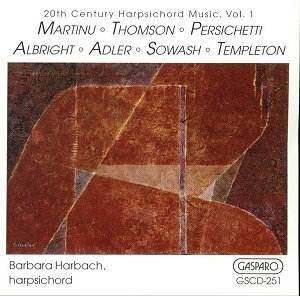This generous collection,
splendidly performed, gives a great
deal of pleasure. It’s a reissue of
two Gasparo issues of the 1980s, one
LP and one cassette – the copyright
dates are
1985 and 1989 – and they’ve been expertly
transferred. The programme has variety,
gives us Martinů’s complete works
(fourteen or so minutes) for solo harpsichord,
the saucy Virgil Thomson Portraits,
some fine contemporary music dedicated
to Barbara Harbach and ending
with Alec Templeton’s evergreen swinger.
There’s something for everyone – and
having listened to one or two of Gasparo’s
rather more austere and forbidding issues
recently this one has commendable vivacity
and luminosity, as well as a non-prescriptive
approach to repertoire generally.
Those Martinů
pieces really are pièces
– French in inspiration since they were
occasioned by the harpsichordist Marcelle
de Lacour, also responsible for commissioning
Martinů’s Concerto. Dancing and
vibrant they are characterful little
studies, characteristic of the
mid-thirties Paris years, but there
is greater substance in the Sonata,
written the year before his death. Gentle,
undulating lyricism informs its little
sliver of a middle section, written
as it is in fantasia form, everything
sounding idiomatic and free. The impromptus
are vivacious and witty bagatelles written
a mere matter of months before his death.
Thomson’s Portraits receive sparkling
renditions – the first deliciously mordant,
the second with a Renaissance feel and
the third in which Harbach uses the
delightful lute stop to suitably bardic
effect (her apt word by the way). The
fourth is a quirky little fanfare.
Persichetti dedicated
this seventh Harpsichord Sonata to Harbach
and it was premiered in 1984. It’s an
idiomatic work, as befits a composer
who wrote so well for the instrument,
with a little Andantino that is constantly
inflected and full of melodic interest.
And the finale is brisk and characterful.
William Albright’s Four Fancies are
riotously exciting, with an abrasive,
obsessive repeated Excentrique
opener and a storming Danza ostinata
with its compound of baroque and boogie-woogie
– wonderful stuff. Adler, born in Mannheim,
also wrote his Sonata for Harbach. It
took its inspiration from Domenico Scarlatti
and is full of scurry and strong chordal
flourish. He juxtaposes insistent writing
with a more elliptical slower section,
but knows how to turn on the toccata
style aggression when required – as
we can see from the driving finale.
Rick Sowash (b 1950) cultivates a deliciously
lyrical and timeless Renaissance feel
in The Unicorn and in the Theme with
Six Variations he takes a rather rustic
sounding tune and the variations unfold
in a perspicacious and attractive way,
full of glint and colour and affection.
Bach Goes To Town evokes the spirit
of Johnny Guarneri, though it’s often
forgotten that it’s the first movement
of Templeton’s Topsy-Turvy Suite.
As ever Barbara Harbach
is a superb guide to the repertoire,
plaintive or driving, glinting or wit-fuelled.
Amidst the mass of releases, new and
old, I hope this one doesn’t get passed
over. It’s addictive.
Jonathan Woolf
The
entire Gasparo Catalogue may now be
purchased through MusicWeb
